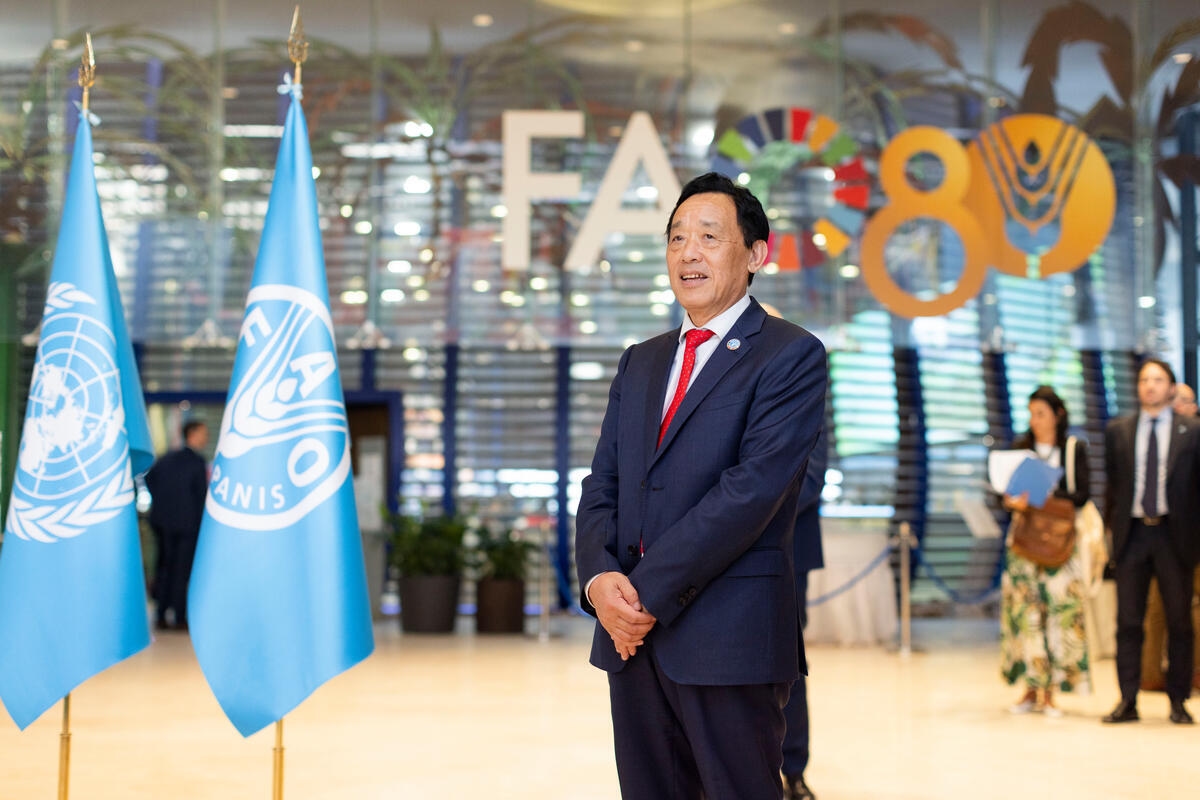Together we can be better. By Qu Dongyu (Director-General of FAO)

By QU Dongyu
Director-General of the Food and Agriculture Organization of the United Nations (FAO)
This year's World Food Day coincides with the commemoration of the 80th anniversary of the founding of the Food and Agriculture Organization of the United Nations (FAO), whose mandate, since its inception, has been to ensure that humanity lives without want.

Today, around 8.2% of the population suffers from chronic undernourishment. This percentage compares with approximately two-thirds of the world's population living in areas with insufficient food supplies in 1946, according to the first World Food Survey conducted by FAO in its early days.
Furthermore, although the population in 2025 will more than triple what it was at that time, the world produces more than enough calories to feed everyone.
As I commemorate this day and reflect on past, present, and future challenges, I'm reminded of a conclusion from that survey so long ago, which stated that we had to decide whether to move forward or backward.
Eight decades of historic achievementsFAO and its Member States have made significant progress: the eradication of the rinderpest virus , the establishment of the Codex Alimentarius and its food safety standards, and the near tripling of global rice yields since the creation of the International Rice Commission in the late 1940s.
Among these achievements are the negotiation of international treaties on fishing practices and genetic resources ; the implementation of early warning surveillance systems to mitigate the risk of animal and plant pests and diseases; the creation and implementation of the Agricultural Market Information System in Support of Trade; and the development of dietary guidelines to address not only stunting but also the growing trend of overweight worldwide.
The first desert locust outbreaks in 2019 coincided with the height of the coronavirus disease (COVID-19) crisis and prompted the mobilization of $231 million to mitigate the crisis, ultimately saving $1.77 billion in losses and securing food for more than 40 million people in 10 countries.
The credit for these achievements rightfully belongs to our Members, who have firmly supported the idea that a world without hunger is better for everyone, rich or poor, North or South. These and other successes demonstrate what can be achieved when nations pool their knowledge and resources, when political will exists, and when effective partnerships are forged.
International cooperation in the face of global challengesThere is an increasing urgency to maintain the spirit of cooperation that has existed for the past 80 years; the global agri-food system is more interconnected than ever, with more than a fifth of all calories crossing international borders before being consumed. At the same time, threats to these agri-food systems from climate events, pests and diseases, economic recessions, or the consequences of conflict do not respect borders and can undo years of progress in the fight against hunger and malnutrition. As we see today with the spread of highly pathogenic avian influenza (HPAI), fall armyworm, and locusts, no country can combat these cross-border threats alone.

We must ensure that the more than one billion people working in the agri-food systems that feed us all have the resilience to withstand and overcome the risks they constantly face.
We have the proven technologies and financial mechanisms, along with enabling policies, technical expertise, and capacity to rapidly achieve the goal of ending hunger. Facilitating market access is critical both to mitigate the inequalities that undermine resilience and to get food to where it's needed.
The four improvements for a future without hungerFull market participation requires access to drought-resistant seeds, sustainable fisheries and forestry standards, agreed phytosanitary standards, digital technologies, innovative resource management tools, and early warning systems.
We have established a framework to expand and accelerate our work. FAO's Hand-in-Hand Initiative identifies and prioritizes investment opportunities where poverty and hunger are highest and agricultural potential is greatest. FAO's One Country , One Product priority initiative promotes unique national agricultural products to boost sustainable agri-food systems and rural prosperity. The South-South and Triangular Cooperation program recognizes that many developing countries have become important actors in global development and economic governance and supports investment and partnerships. The Digital Villages Initiative aims to enable farmers worldwide to use digital technologies, expand access to e-commerce opportunities, and bridge the digital divide. Finally, the Group of Twenty Global Alliance against Hunger and Poverty unites countries and partners to leverage initiatives and investments to eradicate hunger and reduce poverty worldwide. These and many other tools work when applied efficiently and effectively, and they work even better when used consistently and systematically.
At FAO, we channel this vision through the four improvements: Better production, so farmers can produce more with fewer resources; better nutrition, because quality is as important as quantity; a better environment, to maintain healthy ecosystems and their many benefits; and a better life for all, so rural communities can build dignity and realize opportunities. Together, the four improvements ensure that no one is left behind. 
If we decide not to pursue these goals, we will go backwards. Eighty years later, hunger is still present, but it is not inevitable. We can—and must—move forward toward our common purpose. We can complete the task of ending hunger if we maintain continued collaboration. Here's to a better future with food security for all.
QU Dongyu Director-General of the Food and Agriculture Organization of the United Nations (FAO)Main photo: FAO Director-General QU Dongyu attends the opening of the International Day of Awareness on Food Loss and Waste Exhibition. FAO Headquarters (Atrium). ©FAO/Christian Mantuano.
Green Opinion Makers #CDO is a collective blog coordinated by Arturo Larena , director of EFEverde
This column may be freely reproduced, citing its authors and EFEverde.
Other Green Opinion Makers (#CDO) forums
This "green influencer" blog has been a finalist in the 2023 Orange Journalism and Sustainability Awards in the "new formats" category.
efeverde






